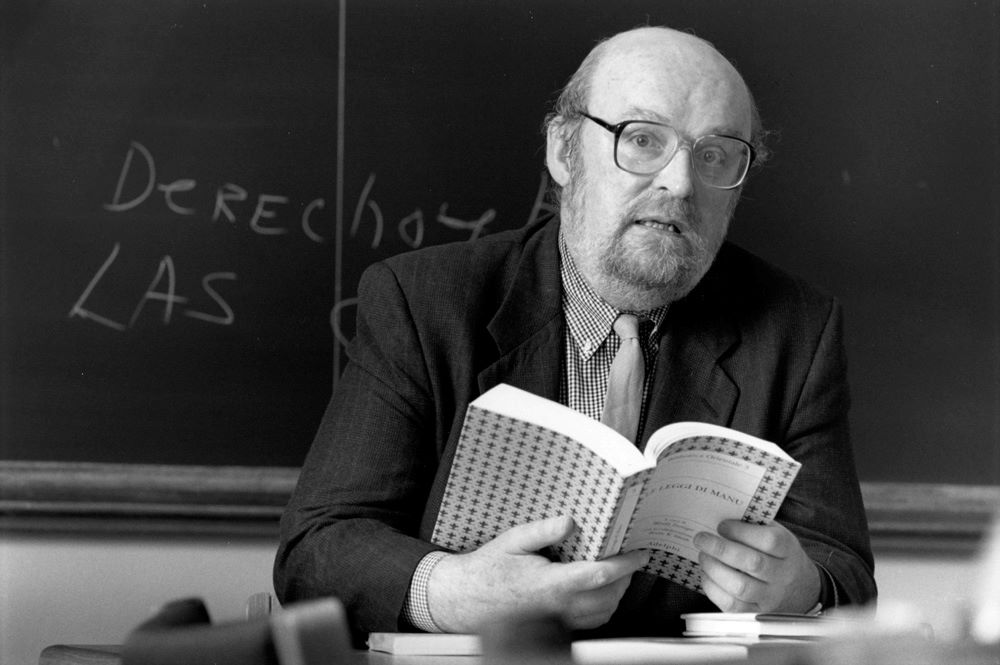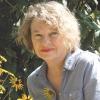
David Tracy, the Andrew Thomas Greeley and Grace McNichols Greeley Distinguished Service Professor in the University of Chicago Divinity School, is pictured in 1997. Tracy died April 29 at age 86. (University of Chicago Library, Special Collections Research Center/Lloyd DeGrane)
In recent weeks, as the church and world learned more about its new pope, many theologians and scholars were also remembering American theologian Fr. David Tracy, who died April 29 in Chicago at age 86.
A former student said Pope Leo XIV's invitation to ecumenical dialogue and to deeper listening within the church reminded her of Tracy, who was described by the University of Chicago as "one of the most important theological voices of the late 20th century."
The university, where Tracy had been a longtime professor at its Divinity School, also said Tracy's work helped "reshape contemporary theology by insisting on dialogue across traditions, disciplines and publics."
Ryan Coyne, associate professor of philosophy of religions and theology at the Divinity School and a former student of Tracy's, told the university that Tracy was "undoubtedly one of the most important theologians of his generation, a towering figure in religious studies."
"For generations of students and colleagues, David was at the very core of their intellectual endeavors. He read so widely and so deeply that virtually everyone on campus found in him a serious conversation partner and a friend. He pivoted with ease from poetry, philosophy and art to the history of science, political theory, and modern fiction," Coyne said in a Divinity School article about Tracy's death. "He took seriously the charge to engage religious and intellectual traditions other than his own, to meet them on their own terms. And he did it all with legendary equanimity and humor, always displaying a boundless generosity of spirit."
'David Tracy said that theology makes claims about what it means to be human and that ought to have implications for society.'
—Mary Doak
Tracy, born in Yonkers, New York, in 1936, attended St. Joseph Seminary and College in Dunwoodie and was ordained a priest in the Diocese of Bridgeport, Connecticut, in 1963. He continued theological studies at the Pontifical Gregorian University in Rome — during the time of the Second Vatican Council — and received a licentiate in 1964 and a doctorate in 1969.
After teaching briefly at the Catholic University of America in Washington, D.C., Tracy joined the faculty at the University of Chicago's Divinity School in 1969 and stayed there until retiring in 2007. Over the years, his major works, Blessed Rage for Order, The Analogical Imagination and Plurality and Ambiguity emphasized that theology was meant as a public discourse well beyond academic circles.
According to Kenneth Woodward, Tracy's longtime friend, and a Catholic columnist and former religion editor at Newsweek, Tracy's hiring at the University of Chicago Divinity School was groundbreaking since the school's faculty had been exclusively Protestant. Woodward wrote in Commonweal magazine that Tracy and fellow priest, Fr. Bernard McGinn, were both hired in their early 30s, and taught alongside world-renowned theologians like Paul Ricoeur, Mircea Eliade and Paul Tillich.
A former student, Mary Doak, a professor of theology and religious studies at the University of San Diego, said that one thing that remains deep in her soul from her years at the University of Chicago in the 1990s was Tracy's "attitude of welcoming respectful disagreement as a reason to think further."
"He was a complex thinker and he presented his main ideas with such a wealth of engagement with the classics, poetry and different periods of Christian theology. It could get hard to follow him but his main ideas were quite clear, " Doak said.
Doak also remembers some of Tracy's public lectures that were attended by members of conservative Catholic groups like Opus Dei who wanted to publicly denounce him as a heretic.
It didn't work, she said.
"They assumed that he would answer in kind and expected him to get defensive," Doak said. "But, he took their questions so seriously and would respond with respectful engagement. The tension in the room just dissipated."
She said Tracy "was an intellectual who loved to think" and he emphasized that theology should address the church at large, a public audience, including politicians, and academics and scholars.
"David Tracy said that theology makes claims about what it means to be human and that ought to have implications for society," Doak said. "If you look at Pope Leo's recent address where he upheld the importance of dialogue within and beyond the church — it feels like David Tracy's spirit. And this is a very different idea than what Catholics thought 50 years earlier."
Advertisement
Another theologian, Fr. Joseph Komonchak, of New York, met Tracy in high school and they remained friends for more than 70 years. Komonchak retired as a professor of theology and religious studies from the Catholic University of America. Tracy's funeral took place May 8 at St. Thomas the Apostle Catholic Church in Chicago; Komonchak presided at his good friend's burial in Yonkers.
Komonchak said Tracy regarded theology as not just something that spoke to the church. "He also saw that it was meant to be a view of the world. This wasn't about some vague world or some 'holy' world. It was about this world! It was also an interpretation of human existence. And he was especially sympathetic with people who find it hard to believe. It's not an easy task, especially in this world. "
Komonchak recalled a time when a group of seminarians were traveling and quoting poetry and asking each other who the poet was. "David was the best at it because he had a tremendous memory," Komonchak said. But he also said his friend never flaunted his intelligence or his remarkable gifts.
Komonchak last spoke with Tracy about a week or 10 days before he died. "We were talking and he said he wanted to find something 'light' to read. I suggested Dickens' Pickwick Papers, and he said, 'That's a good idea. I'll try to find my copy,' " he said. "I'm going to miss him terribly. We were able to renew our friendship every time the phone rang."





